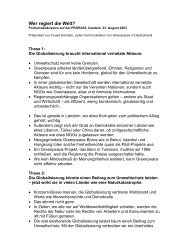WASTE TRADE IN THE MEDITERRANEAN ... - Fouad Hamdan
WASTE TRADE IN THE MEDITERRANEAN ... - Fouad Hamdan
WASTE TRADE IN THE MEDITERRANEAN ... - Fouad Hamdan
You also want an ePaper? Increase the reach of your titles
YUMPU automatically turns print PDFs into web optimized ePapers that Google loves.
- Hans Ernst Kunz: Head of a Project Group (Projektgruppe Sonderabfallentsorgung), at the Ministry of<br />
Environment in Baden-Wuerttemberg (Kerneplatz 9, 70182 Stuttgart, T ++49-711-1262675, F -1262881)<br />
- Paul Wiennand: Scientific assistant at the “Research Institute Plastic Recycling” (Wissenschaftlicher Assistent,<br />
Forschungsinstitut Kunstoffrecycling) in the town of Willich. (Siemensring 79, 47853 Willich, T ++49-2154-428824,<br />
F 428823, Private: ++49-2156-2866.)<br />
During the inspection, Greenpeace pressed Germany to take back from Lebanon all the 36 containers. No<br />
distinction should be made between contaminated and not contaminated wastes.<br />
5. LEBANESE ENVIRONMENT M<strong>IN</strong>ISTER LOSES JOB OVER SCANDAL:<br />
Environment Minister Pierre Pharaon issued a "certification" on 23 July 1996 in which he wrote that the Ministry of<br />
Environment has "no objection" about imported plastic waste being used in the industrial process of the Lebanese<br />
factory "Rocky pour le Commerce et L'industrie" in Blat-Jbeil.<br />
Pharaon wrote a letter to the Higher Coucil of Customs saying that factory owner Robert Khoury wanted to use<br />
plastic waste, described in French as "Rognures et debris de matieres plastiques". But Mr. Isam Hobballah, the<br />
head of the Higher Council for Customs, answered on 4 July 1996 rejecting this.<br />
The way Mr. Pharaon dealt with this issue and with past waste trade schemes made him lose his job during a<br />
government reshuffle in November 1996. It was not clear whether the company in Blat-Jbeil had also tried to<br />
purchase the plastic waste from Germany or from another foreign source.<br />
6. CHRONOLOGY OF EVENTS:<br />
30 October 1996: Greenpeace calls on the German government to return the 36 containers full of contaminated<br />
plastic waste from Lebanon. Germany has a moral and legal responsibility to return the waste.<br />
6 November 1996 - Greenpeace charged that German authorities in Bonn are dragging their feet and downplaying<br />
the issue of the 36 containers. Greenpeace also called on German officials in the Environment Ministry and in the<br />
Foreign Ministry in Bonn not to waste time and return the waste swiftly. It is unacceptable that German officials are<br />
claiming that there is no evidence that the containers are full of unsorted plastic waste partly contaminated by<br />
chemicals. And they are insinuating that they would return only the contaminated waste.<br />
13 November 1996 - The German waste trade scheme was an illegal operation under German and European<br />
Union (EU) laws, a Greenpeace expertise said.<br />
27 November 1996 - Greenpeace called on Germany to take back from Lebanon all the 36 containers. No<br />
distinction should be made between contaminates and not contaminated waste. The call came as three German<br />
scientific and legal experts inspected the containers at Beirut Port. Lebanese officials and Greenpeace were<br />
present at the site and documented the inspection. Officials in Germany refused to clearly state that they would<br />
return all the waste and insinuated that they might return only the contaminated wastes. This is unacceptable and<br />
outrageous.<br />
7 February 1997 - Greenpeace said that “technical and bureaucratic” measures are delaying a decision to finance<br />
the shipments of German plastic waste back from Beirut to Germany. A official from the Environment Ministry in<br />
Bonn told Greenpeace that the German state of Baden-Wuerttemberg has informed the ministry that the 36<br />
containers with plastic waste in Beirut should be returned, and that the financing should be done by Germany’s<br />
"Solidarity Fund for Re-Exporting Waste". However, the authorities in Baden-Wuerttemberg have failed to inform<br />
Bonn about the quantity of the waste, the costs of the re-export operation and what will happen to the waste in<br />
Germany.<br />
12 February 1997 - Greenpeace welcomed the decision of the Lebanese Ministry of Environment to adopt a new<br />
regulation that bans the import of all hazardous waste into Lebanon. The ministerial decision bans all waste imports<br />
for final disposal or for incineration and all hazardous waste imports bound for recycling. Wastes imported for final<br />
disposal disguised as "for recovery" (that is incineration) will also be outlawed. Greenpeace has provided ministry<br />
officials with documents to help them draft the strict regulation.<br />
The Lebanese authorities had been ignoring the issue of toxic waste trade for years. They had banned<br />
Greenpeace ships from visiting Lebanon in 1995 and 1996 to prevent the organisation from working on this issue.<br />
The Greenpeace Mediterranean Office has been campaigning in Lebanon against waste imports since 1994 when<br />
it exposed that toxic waste imported from Italy in 1987 was still dumped in many areas.<br />
3




